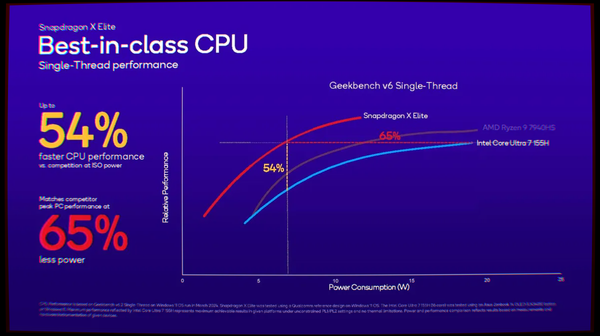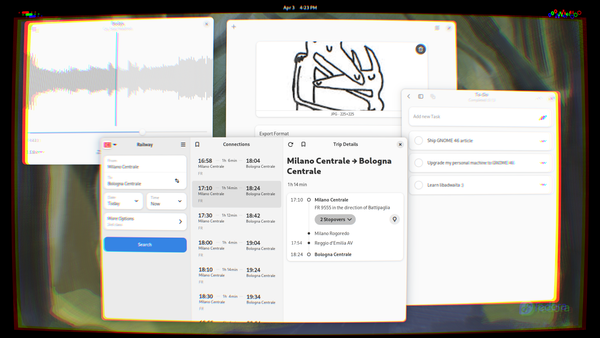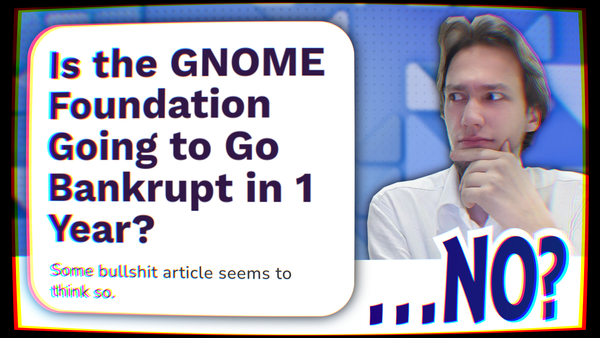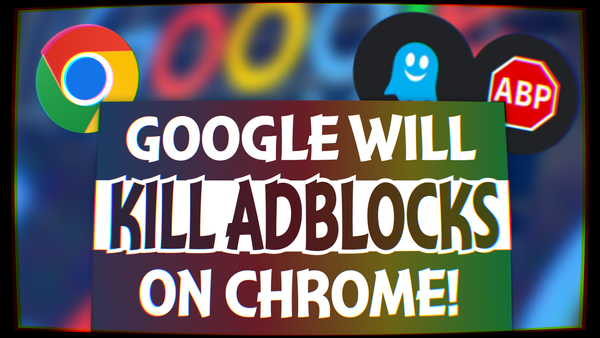Rise and Fall of Open Source Projects
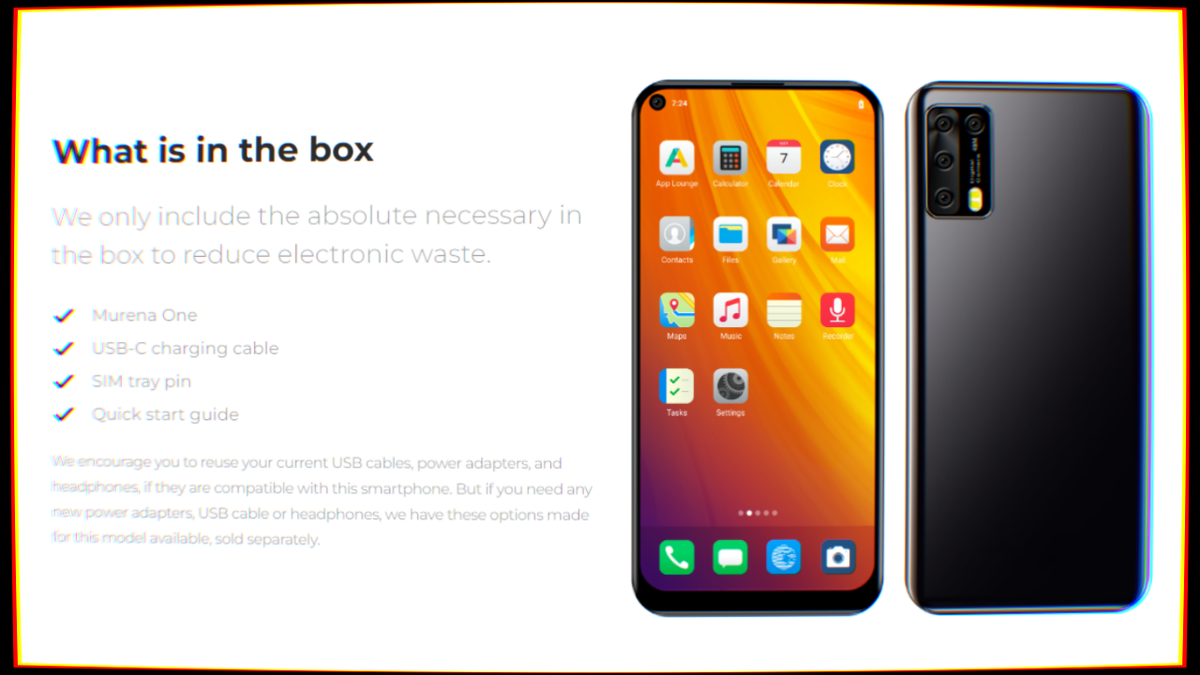
Sometimes it's … worrying how easy it is for Open Source projects to fall. Even those that are apparently solid, with a stable income and lots of users. You probably heard of the Simple Mobile Tools suite: they provide applications with million of downloads, they were able to sponsor financially other Open Source projects, and just a few months ago they were publishing blogposts about how they would never sell your data.
And then… it happened. In just a week - or even less - the project fell. It crumbled on itself so hard that the applications are now trying to scam money out of users and are full with privacy-invading advertisement. You probably heard of this when it happened, but… have you? Like, the whole story? I thought I did but, there was more! So, let's start from the beginning.
Summary of SMT Timeline
This is Tibbi, short for Tibor Kaputa, which is prooobably not how you pronounce it. He's from Slovakia and has worked as a software developer for years, especially working on Android applications.
In 2016, however, he decided to fund a project called "Simple Mobile Tools". The idea is to have a suite that only uses the permissions that are actually required for the application to run; he says,
I’ve just checked my device and the crappy preinstalled custom Email client requires almost double the permissions than Gmail does.
He's also fed up with advertisement within Android applications. He makes a great point of many of them mostly hoping the user to click on them by mistake; he says, a file manager with ads between folders is just unacceptable and won't stay on my device for long.
So, let's actually make an ad-free suite that has the great user experience you'd expect: customizable widgets, a simple and to-the-point user experience that actually helps you out. Oh, and let's make all of them open-source and distributed through F-Droid. Great.
He very quickly published a large amount of basic applications. There's a Simple Gallery, Simple Clock, Draw, Music Player, Dialer, Voice Recorder, and so on. The project grows quickly, with 24 applications in 2017 totaling more than 60 Million downloads.
There's one major issue to tackle, though. If there's no ads whatsoever, how can the project even be economically sustainable?
Well, firstly, you can donate. There's Patreon, Paypal, bank transfers and even crypto. I can't know how much he made this way, but it does not seem to be enough to become a full-time developer. In 2022 the project had a little more than one hundred supporters, making just $220 per month. In 2023 that increased to 240 dollars. Not enough, and I'll guess from my own donations that bank transfers and paypal were roughly the same.
Tibbi thus decided to paywall some applications. However, he did so in a very thoughtful way, which I really appreciated. Firstly, there's a "Simple Thank You" application on the Play Store; it costs one buck and it unlocks all features from the entire suite. Even better, it's not one of those "one buck each month" subscription, it's actually a one-time payment to have all the features of the entire suite, forever. You could also ask for a refund at any time, and - according to its website - you'd get one, no questions asked.
Some other applications would also have a similarly priced pro version with some extra features. There's Simple Notes Pro, with the ability to customize colors and features, and Simple Gallery Pro, featuring the ability to edit the photos directly within the app. So far, the project has the most sensible price I've ever paid for in the Play Store.
Throughout the years, the project also focused on building a brand. If you go through all the available apps you can see how they're all the same shade of orange, with simple icons and always the most obvious name. Over time, more complex projects were also attempted: as an example, we have "Simple Launcher", which is … a launcher, with the ability to move apps around, add widgets, and so on.
I don't have any data about this -- but it sounds like the project was big enough and making enough income for Tibbi to actually contract some external developers to work on these projects. The other main contributor is Naveen Singh, who got involved in mid 2022. The guy even has a YouTube channel, so go give him some love!
The Mysterious Phone
Occasionally, the project would try to cash in its strong brand to attempt some particularly ambitions projects. As an example, did you know that they tried to release a phone? Obviously, it was marketed as the "Simple Phone". Its webpage is still up and running at the time of recording, though sadly the product is apparently sold out. The idea was to have a project that comes with the Simple Mobile Tools and nothing else. Even the operating system, based on Android, is called "SimpleOS" and is Google-free (but with microG pre-installed as a Google Play services alternative, which I think is great for the average user).
Now, an Android derivative OS is probably a project that's a bit more complex than the average Simple android app. According to the website, it is developed (or… should've been developed?) by the "Good Phone Foundation". Which I … had never heard of?
The foundation's GitHub page has a grand total of not a single commit since it was created, but they did create two repositories. Or, rather, they forked two projects and never actually did any work on them. They advertise a privacy-focused ROM called "Lunar Open Mobile Platform", which SimpleOS claims to be based on. What?
The only public information I could find is a now-deleted post which details all the Android components that might put your privacy at risk. As an example, whenever you turn on your phone, the device pings google services. Then there's DNS issues, where your Internet Service Provider might pass the network traffic to large corporations like Google. And then, of course, there's Google Play Services, System WebView, and more. For each one of these issues, Tibbi explains how they solved the issue: they replaced Play Services with microG, they made the phone check Internet on a safer URL, changed DNS, and more. All of this makes me think that SimpleOS very much was a thing.
What about the phone, though? Did people… buy it? Where is it? Why can't I find anything about it?
Firstly, as you may be aware of, building phones is somewhat hard. What Tibbi most likely decided to do is to buy some cheap Chinese-manufactured phone as-is and then installed a custom ROM and re-sold it at a higher price. Reddit user "GivingMeAProblems" - yes, I'm using "Reddit user" as a source - was actually able to trace the exact phone on Alibaba: it's this one! You can actually buy it, it starts from 3000 pieces at 135 bucks a piece. That's a 40k investment, reasonably low.
Aaand yet, I somehow doubt that there's 3000 simple phones around the world. Is there … any?
If the design looks familiar to you, you might be a Linux expert. Look at this other Linux-friendly phone: the Murena One. Reminds you of anything? Yeeah, looks like they both use the same exact phone model. So, huh, I guess you could buy this one and just … install SimpleOS on it? Oh, well, this one's out of stock as well, nevermind. As the same reddit user wisely say:
Companies like this can buy outdated components more cheaply than when they were current, put them together and sell them for a reasonable price. Someone else did most of the development when this tech was new, that is why it is on Android 11. I would think it pretty unlikely that this will ever see an OS upgrade, indeed they don't promise any, only 'software updates', so probably security patches.
Well, all of this pretty much killed any interest I had in the project, and I could not find a single person saying they actually paid for the phone, which makes me think that it wasn't particularly successful and eventually just … scrapped.
However - plot twist - it does exist. There's at least one unit that we know of. YouTube Tech Spurt actually made a review of the phone one year ago. There's still some weird thing - such as the description calling it "Simple Phone X2" -- why? This is literally the only webpage I could find with such a product name. We can finally get a look at SimpleOS, though. And, honestly? Looks interesting.
The description also mentions that the hardware is "very similar" to the Murena One (erm, yeah, very similar indeed). Before I move on from this whole project, let me say to Tech Spurt, who - unlike me - is actually a serious YouTuber and probably still has the unit in some drawer somewhere: ehm, hey cough Chris Barraclough cough can I have it? Could you … send it to me? Please? Worth a shot.
The Next Step?
Well, the whole Simple Phone thing now feels like a bit of a misstep now, but let's forget about that and focus on the future of the project. Just in December 2023 we got a pretty major announcement: the whole project was sold to ZipoApps, a company from Israel that specializes on buying applications to cough bring them to the next level, by unleashing their potential and elevating any mobile application. We know that they're serious in this goal because their entire website is one plain webpage filled with vague promises and stock images. Also, their webpage has a Steve Jobs quote.
Quality is much better than quantity.
Yeah.
Also, this is completely irrelevant, but they have a public address for their company, and it leads here. So, ehm, yeah, I actually think it gives some context in who might be running the company, money-wise.
The announcement was done … weirdly. The author of the applications in the Play Store changed to ZipoApps and the support email was changed to a ZipoApps one, but the developer said nothing publicly about any of this. Somebody opened a GitHub thread about it, and Naveen Singh replied with:
I can confirm it's true, but I don't have details on who, when, or where.
Which… Okay I guess. Finally, Tibbi replied with
ye, the sale is in process
And nothing else.
But still, this might be a great occasion for Simple Mobile Tools. A company with a strong know-how in developing Android applications could make wonders, and it might even allow to hire even more open-source developers to work on the project. However, it's still a for-profit company, and the current payment system - one buck for all the features as a one-time payment - might not be enough for them. Still, I think they should be careful in changing that too much, as the audience of this suite is, you know, privacy-first people.
They actually immediately changed the business model of Simple Tools. Firstly, they decided to introduce advertisement in all of the free applications. This is pretty bad already, as the whole idea behind Simple Mobile Tools was to, you know, not have ads. But maybe it's worth it, if it means better applications with more features? You can still pay to have an ad-free experience.
They also changed the payment, though. They decided to switch to a subscription model, so it's no longer a one-time fee. I'll make a comparison, look, I'm sure you'll find the new price to be reasonable. Previously, the price was €1 (one time). Now, the price is 825 dollars / year. Wait, that can't be right. Oh, wait, f***, it is. What? And this is just to have … editing options in the gallery app. You need to pay another $825 on top of that if you also want to customize the color of your notes. So, ehm, yeah, it's your average 1650 bucks/year subscription model, right? Reasonable.
Ok, so, who the f*** is ZipoApps. They have more than one hundred applications in their Google Play page, covering a very wide array of functionalities, from Whatsapp stickers to Guitar tuners and more. Okay, let's give a brief look at them. The guitar one. That one also has a subscription model, which feels crazy for something as simple as a … guitar tuner. The subscription is 1000 dollars every year. One thousand. However, don't worry, as ZipoApps is
sorry to hear that the price for the Premium subscription seems high to you. Please, note that the App on the Premium version opens up many exciting features and opportunities for you and it is definitely worth the
f*** you! You want me to pay more in a guitar tuner than in taxes! You want another example? Here's "AmongLock", which introduces a lockscreen with the same look as AmongUs. If you want a custom login text, HD wallpapers (frigging hd wallpapers) and no ads, you have to pay - guess how much - 825€. And, actually, this subscription screen has the same exact look and feel on every single one of their applications. They just … copypaste the code.
They have a Trustpilot account which, honestly, is terrifying. The overall score they get is 3 out of 5, which is okay, I guess. However, if you go through the whole thing, it becomes quite clear that it's full of either:
- 5 star ratings from people who claim they just sold their application to them
- 1 star ratings from desperate people asking for refunds and claiming they've been stolen money. It's unclear whether they do steal money as dozens of reviews suggest, or whether they just ask for a crazy high price and people subscribe without realizing.
They seem to be making an incredible amount of money out of this. According to Zoominfo, the company has a renvenue between one and five millior dollars per year with 26 customers; it seems like it was founded in 2020 by this "Oren A." guy who buys and re-sells digital products for a living. There might be other three co-founders, and all of them are from a company called "Rounds". One of them is even the Vice President. I highly suspect that ZipoApps is some sort of Rounds subsidiary, especially since they were both founded in the same year and their addresses are 10 minutes far. Rounds describe themselves as:
A transformative technology that turns mobile assets into businesses.
They do have at least one Senior Android Engineer, who thinks that the company is great because he gets to "work with a talented and motivated team" but "some times the work is boring and repetitive". Honestly, I'm shocked they have any software engineer at all!
You got the idea: it's a company that buys applications and pretty much hide all the interesting features behind some insane subscriptions, hoping to trick people into them. There's no way that anyboy could believe those prices are sane and, even worse, it's incredibly easy to know about all of this through a very quick google search. This means that either Tibbi knew this was going to happen and didn't care, or he didn't research the company he decided to sell his entire suite to. Neither option feels great. I tried to get in touch with him, and he confirmed that Simple Tools
sadly got some paywalls and maybe ads
Which is … an understatement, to say the least. Though, I have to admit, I can understand wanting to stop working on project and selling it for some cash; it was his project, and he has the right to do that. I'm particularly fine with what he did because, as we'll see later, we can still enjoy the applications as they were - without paying anything - and the development will nonetheless continue. There's one big question that we should address, though: why? But, you know what, there's one that's even more urgent: you can sell open-source projects? How!?
Selling Open Source Projects
Well, thing is, we don't know what type of contract Zipo Apps uses. We don't know what Tibbi actually sold to them. I mean, we know for sure he sold his Google Play store applications, as in, Zipo can now change those applications and will receive the renvenue from them; however, a project being GPL licensed does not really prevent you from selling a spot in the application store, so that's fine. Now, Zipo did change the applications - to add the payments - but they don't actually need to buy the code to do that, because … everything is open source. This is probably an exception for them, as every other application they've bought so far isn't. Most likely, they have some kind of standard contract where they buy everything, including the code. If that's the contact Tibbi signed, and we don't know, then there might be issues.
According to a very thoughtful estimate by Tibbi,
you should know that like 99% of the current code has been written by me and other paid devs, so no need to overreact the licensing thing…
which … sounds weird? I mean, you cannot sell something that you only own 99% of, for obvious reasons; and there are multiple areas of the project where that number drops significantly. Take translations: I don't have specific numbers, but you can see contributors who helped out through Weblate to translate the project, and even other developers having contributed to the project without any formal agreement with Tibbi. He doesn't have a right to sell anything that includes those contributions, which aren't his.
And, honestly, this might be an issue for ZipoApps as well. They now have bought a GPL project. As part of the license, they have to provide the source code everytime they release a new version of the application, otherwise they're not GPL compliant and might get sued. And they did release a new version, because, you know, they added the paywall thingy that asks for an insane amount of money. And of course they didn't release any source code for that (technically, maybe no one asked them, but come on, they're not going to do that anyway). Even worse, they cannot change the license on the project because that requires a formal agreement from all the past contributors, such as Mr-Bajas on GitHub, or Aga-C.
Even though we don't have the contract that Tibbi signed, we do have some … clues. When Tibbi was asked
Are you aware that anyone who contributed to your apps need to agree to a change of license?
He actually replied with:
not really, thats not how it works
Which… I mean, it's literally in the FAQ of the GNU project. If somebody else contributed to your project, you do not have ownership on that contributed code, and you can not change the license of something you don't own. This is part of the reason why some bigger projects backed by for-profit companies ask for you to sign a contributor license agreement before you contribute any code to the project; that agreements grants them the full ownership of what you contribute. This was not the case for Simple Mobile Tools.
Now, I don't actually expect a lawsuit to happen, even though both players, Tibbi and ZipoApps, seem somewhat unaware of how licensing and copyrights work in the open-source world. However, there is a tool that previous contributors might use to try to cause some problems: DMCA claims. This is a functionality offered by Google itself where you can report content that violates copyright laws. However, it has to be done by a previous contributor and it seems like no one has stepped up … yet.
But… why?
But… why? Is it a quick cash grab, or was the project not financially stable anyway? According to Tibbi, neither. The project was sustainable, but he did not really see any kind of growth opportunity ain the future, and he didn't like where Android was heading for the future, with developer experience getting worse and worse. We have some more details here:
I just dont like where Android is heading anymore. Android 14 is the worst version so far (Ive been around since Android 1.6), but the newly redesigned Dev console app is also just too bad now and it would take me a lot more extra time to maintain the apps, reviews etc. The general UX is getting worse for both users and devs for quite a few years now.
Initially, I wanted this segment to be all about how the open-source world doesn't have a way to make big projects financially sustainable. But really, this is not the case. Through simple recurring donations, like Patreon, and selling extra features for a one-time fee of 1 euro, it seems like the project was doing just fine; not only Tibbi was paying other developers to work on the project, but Simple Mobile Tools was actually a Gold Sponsor of Linux Mint, giving them $12,000 every year. We cannot know for sure, but it does not seem like the project had any financial issue.
We really just have to accept that Tibbi decided to work for years and years on an application suite that aimed for a platform that, over time, he kind-of stopped liking; he could've silently stepped back, and let the applications go unmaintained, but he preferred to get the most out of his work by selling everything. This hurts, especially when just a few months ago Tibbi was publishing articles such as "How much does your data cost? We know the price!", where he brags about turning down 42$ per user in tracking. I mean, listen to this:
However, we want to assure you that you are not at risk of anything similar with our Simple Mobile Tools apps. Instead, we bet on transparency and a fair approach to users.
This was three months before Tibbi decided to, somewhat carelessly, sell his userbase to a company that's only known for trying to deceive users into paying insane prices for basic functionalities. Ultimately, maintainers - even those who truly believe in privacy and open-source values - are still… people, and we can only trust them up to a certain extent.
Enter Fossify
So, what about now? Is the project going to die?
Absolutely not. Firstly, you can still use all of Simple Mobile Tools, without having to pay the extra fees, simply by downloading them from the privacy-respecting F-Droid store. They're still open source, and ZipoApps couldn't hide the old source code even if they wanted to.
Even better, do you remember the main other contributor to the suite? Naveen Singh? He took a bit of time to think, and then decided to fork Simple Mobile Tools to continue development himself, with the help of the wider community. His work is currently sponsored by some GitHub users, though probably it does not yield much money yet. Funnily enough, one of the sponsors is Tibbi himself. He also has a dedicated Patreon account which you can subscribe to, and he also uses PayPal and Liberapay.
The new name is Fossify. You can find all of the previous applications there, and they're currently working on releasing a new version. Some issues they had to deal with are somewhat fun - as an example, a new build of Fossify Gallery would tell the user that he is
using a fake version of the app. For your own safety download the original one from www.simplemobiletools.com
which was actually a safety feature to make sure that people didn't repackage Simple apps but with some extra trackers and uploaded the APKs somewhere. Also, stuff like app icons and such was technically not part of the GPL side of things so I think they had to change those.
We got a new release of the applications three weeks ago, at the time of recording, with APKs and everything. A few days ago they started to upload the new apps to the Play store, so you can actually go ahead and install them. If you do that, you literally save 850€/year in subscriptions, for the same exact features. Right now Fossify has less than 100 installs on their applications, but I'm certain those will grow over time.
Just, maybe, don't do a Fossify phone? Didn't work the first time, probably won't work the second one. :-)


